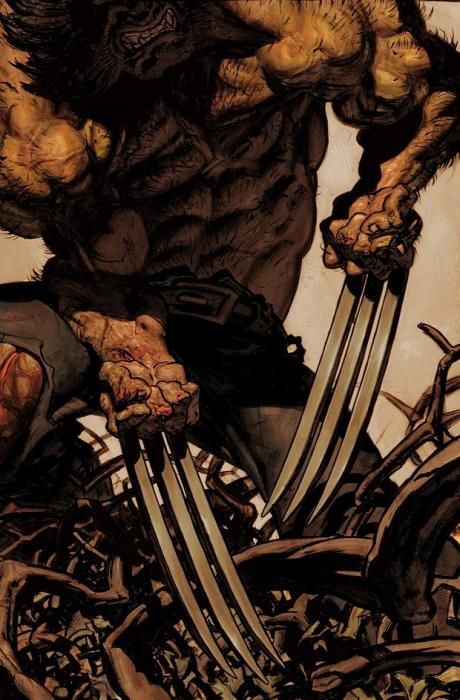At this rate, it isn't going to be long before the numbering on all Marvel comics makes absolutely no sense at all. If anyone can convincingly explain to me what rational basis there is behind putting the number "1000" on this issue, I will personally donate my copy to them. But I don't think that's going to happen, because as near as I can tell, the only reason is "books with important-looking numbers sell better than those without." If Marvel keeps doing things like this, soon even that won't be true.
Still, if we look past the numbering to see what this is -- a larger-than-average Wolverine anthology -- we do arrive at a half decent book.
I say "half decent" because the stories are mostly mediocre. Two of them are set during World War Two, and two of them involve Wolverine fighting Werewolves, which begs the question: if you have to choose five stories, why not choose five that don't overlap?
Indeed, the best story in the issue, "Adamantium Claws" by Sarah Cross and Joao Lemos, doesn't feature World War 2 or Werewolves, is told from the perspective of a high schooler and Wolverine fan who finds herself eating in a diner with a sympathetic old guy who bears an uncanny resemblance to Logan himself. No prizes for guessing the twist, but it's otherwise a brilliant little story, beautifully drawn and engagingly written. If we were grading the stories separately, this would be a five-star story in itself.
We're not, though, and the rest of the book is more uneven. Rick Spears writers an opener that's action-packed and enjoyable enough, leaning heavily on Marvel Universe continuity, but it's the art by Timothy Green that really makes the story sing. The second story, "Legend of the Crimson Falls" by Jimmy Palmiotti and Rafa Garres, is a meaty (in more than one sense) story with obvious influences in 1970s horror comics, though beyond that it's not entirely remarkable (except the artwork, which is again great, though in an entirely different way to both Lemos and Green).
The final two stories are weaker. "Development Hell" by Simmons & Ryan (oddly absent from the contents page) tries not to take itself seriously, but instead comes off diluted and self-conscious where it should have been outright absurdity. Hernandez and Ross' "Last Men Standing" gives us a nice character moment, but that's all it is. While Ross' artwork is almost ethereally beautiful, it seems at odds with the tone of the story, while his tall, thin, chiselled Wolverine is massively off-model (unless it was supposed to feature Hugh Jackman, I suppose).
It's certainly a good looking book, and since no story fails entirely, you should feel like you've gotten your money's worth. Certainly, if you just fancied reading a couple of Wolverine stories (as I did when I picked it up) it'll sate that desire, but at the end, Cross' is the only one that you might want to go back to once you've read it once.

